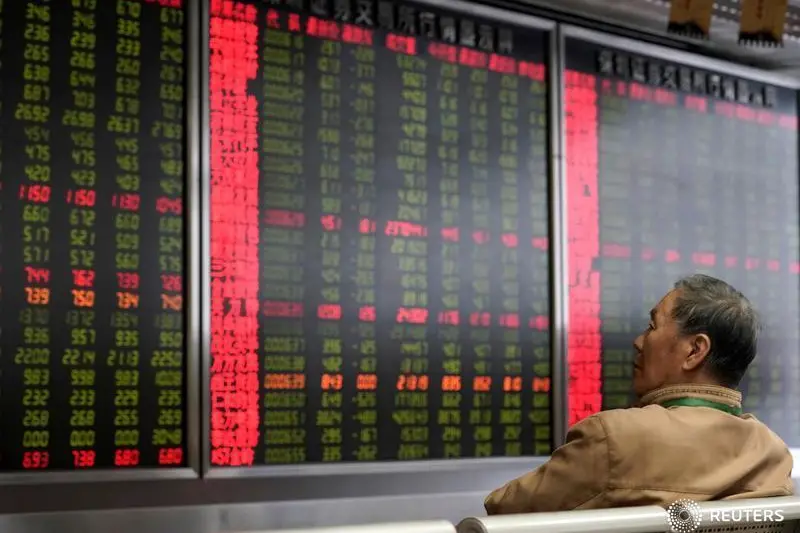PHOTO
- Asian shares drop despite positive news on trade talks
- EGX30 rises 2.8 percent, rest of region retreats
- Oil prices rise on Libyan supply interruption
- Dollar retreats marginally, gold steadies
Global markets
Asian shares fell in early trading on Tuesday as trade tensions between the United States and China weighed on investor sentiment, despite Beijing confirming it was still in trade talks with its American counterparts.
China’s Commerce Ministry said that Chinese Vice Premier Liu He spoke with U.S. Treasury Secretary Steven Mnuchin and Trade Representative Robert Lighthizer on Tuesday, exchanging views on pushing forward the next stage of trade talks.
The positive news failed to push markets higher, as uncertainties over a resolution of the trade dispute kept sentiment fragile.
Japan's Nikkei reversed early gains to trade down 0.3 percent and Hong Kong's Hang Seng index eased 0.4 percent.
MSCI’s broadest index of Asia-Pacific shares outside Japan was trading near a 3-week trough.
“Remember this isn’t the first time these backroom negotiations have tangled a carrot in front of the markets,” Stephen Innes, head of APAC trading for OANDA, told Reuters.
“And while I view this development as positively significant in the broader context, a trade war is far from over.”
Middle East markets
Egypt’s blue-chip index EGX30 added 2.8 percent on Monday with 26 of its 30 stocks gaining.
The country's largest lender, Commercial International Bank, added 4.8 percent. The Middle East's biggest investment bank, EFG Hermes, gained 4.9 percent.
El Sewedy Electric rose 4.9 percent after it said its unit had signed a contract to develop land at Ain Sokhna economic zone.
Dubai’s index dropped 2 percent as Union Properties fell 10 percent to trade at its lowest in more than five years, while Emaar Properties dropped 4.6 percent to hit a more than five year closing low.
Abu Dhabi’s index dropped 1 percent, as banking shares weighed on the index. The index heavyweight First Abu Dhabi Bank shed 0.9 percent, while Abu Dhabi Islamic Bank dropped 3.8 percent.
Saudi Arabia's main index slid 0.3 percent. Riyad Bank shed 2.3 percent and the top petrochemical maker, Saudi Basic Industries, fell 0.7 percent.
Qatar's index fell 0.5 percent with Qatar Navigation falling 2 percent and Qatar Fuel losing 1.4 percent.
Kuwait’s index fell 0.7 percent, Bahrain’s index was mainly flat and Oman’s index dropped 1 percent.
Oil prices
Oil prices edged higher in early trading on Tuesday as Libya’s National Oil Company (NOC) late on Monday declared force majeure on exports from the El Sharara oilfield.
NOC said the shutdown would result in a production loss of 315,000 barrels per day (bpd), and an additional loss of 73,000 bpd at the El Feel oilfield. Despite the expected drop in supply, sentiment remained weak, limiting gains in prices.
International Brent crude oil futures were at $60.19 per barrel at 0336 GMT, up 19 cents, or 0.3 percent, from their last close.
U.S. West Texas Intermediate (WTI) crude futures were at $51.16 per barrel, up 16 cents, or 0.3 percent.
“The general risk-off tone in global markets and the stronger dollar ... are contributing to the selling pressure,” OANDA's Innes told Reuters.
Currencies
The dollar index, which measures the greenback against a basket of six major currencies, was last down 0.1 percent.
The dollar climbed on the yen to 113.19.
Precious metals
Gold prices steadied in early trading on Tuesday.
Spot gold XAU= was steady at $1,244.71 per ounce, as of 0114 GMT.
U.S. gold futures GCcv1 were little changed at $1,250.1 per ounce.
(Reporting by Gerard Aoun; Editing by Shane McGinley)
Our Standards: The Thomson Reuters Trust Principles
Disclaimer: This article is provided for informational purposes only. The content does not provide tax, legal or investment advice or opinion regarding the suitability, value or profitability of any particular security, portfolio or investment strategy. Read our full disclaimer policy here.
© ZAWYA 2018





















